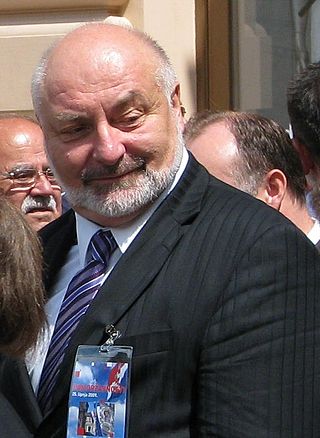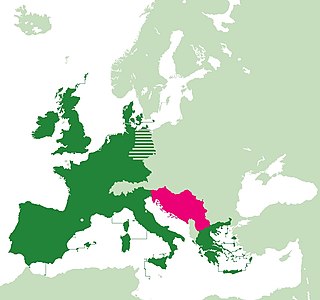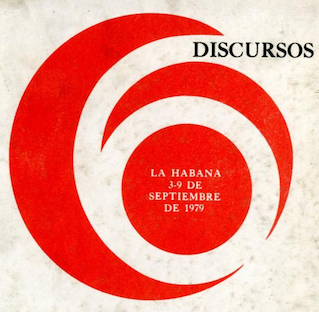
The Croatian Spring, or Maspok, was a political conflict that took place from 1967 to 1971 in the Socialist Republic of Croatia, at the time part of the Socialist Federal Republic of Yugoslavia. As one of six republics comprising Yugoslavia at the time, Croatia was ruled by the League of Communists of Croatia (SKH), nominally independent from the League of Communists of Yugoslavia (SKJ), led by President Josip Broz Tito. The 1960s in Yugoslavia were marked by a series of reforms aimed at improving the economic situation in the country and increasingly politicised efforts by the leadership of the republics to protect the economic interests of their respective republics. As part of this, political conflict occurred in Croatia when reformers within the SKH, generally aligned with the Croatian cultural society Matica hrvatska, came into conflict with conservatives.
The Belgrade declaration is a document signed by President of Yugoslavia Josip Broz Tito and Soviet leader Nikita Khrushchev on 2 June 1955 that brought about a short reconciliation between the two states. Negotiations leading up to the signing of the document took place between 27 May and 2 June.

Jutarnji list is a Croatian daily newspaper, founded and continuously published in Zagreb since 6 April 1998, by EPH which eventually changed name in Hanza Media, when bought by Marijan Hanžeković. The newspaper is published in the berliner format and online. Its online edition jutarnji.hr is the second most visited news website in Croatia after Index.hr.

Slobodan Uzelac is a Croatian Serb politician who served as Deputy Prime Minister of Croatia for Regional Development, Reconstruction and Return in the second cabinet of Prime Minister Ivo Sanader and his successor in that position Jadranka Kosor. He is the first member of the Serb minority in Croatia to hold a cabinet position since the first Croatian multi-party elections were held in 1990.

Full diplomatic relations between Croatia and Israel were established on April 9, 1997 following Croatia's independence from SFR Yugoslavia. Croatia has an embassy in Tel Aviv and honorary consulates in Ashdod, Caesarea, Jerusalem and Kfar Shmaryahu. Israel has an embassy in Zagreb. Relations between the two countries are described as friendly and highly cooperative. In recent years, Croatia and Israel intensified bilateral relations and cooperation in the field of defence and security. Croatia is one of the countries Israel occasionally turns to inside the EU to advocate on its behalf and it generally abstains or votes with Israel on key EU votes at the UN. Israeli president Reuven Rivlin described Croatia in 2019 as "Israel's strong ally in the EU, the UN and other multilateral organizations."
Melita Švob is a Croatian Jewish biologist, scientist, and historian.
The Open Letter on the Position and Status of Serbs in Croatia was sent to the addresses of prominent Croatians and Serbians in September 2008. The letter spoke about the adverse social and economic circumstances in which Croatian Serbs had lived.

Budimir Lončar is a Croatian retired diplomat who served as a Minister of Foreign Affairs of SFR Yugoslavia from 1987 until 1991.
Martin Previšić is a Croatian historian. Previšić is an assistant professor at the University of Zagreb's Faculty of Humanities and Social Sciences.

Dejan Jović is a political scientist from Croatia. He is a full-time professor at the Faculty of Political Science at the University of Zagreb. From 2012 to 2020, Jović was editor-in-chief of the Croatian Political Science Review, one of the leading academic journals of political science and social science in Southeast Europe. He is also one of the founders and editor-in-chief of the peer reviewed journal Tragovi: Journal for Serbian and Croatian Topics published by the Serb National Council and the Archive of Serbs in Croatia.

From the establishment of the European Economic Community in 1957 until the breakup of Yugoslavia in the early 1990s, thus during the Cold War period, the Socialist Federal Republic of Yugoslavia was the first socialist state to develop relations with the organisation. Notwithstanding occasional and informal proposals coming from both sides, Yugoslavia never became a full member state of the EEC.

The Socialist Federal Republic of Yugoslavia was one of the founding members of the Non-Aligned Movement. Its capital, Belgrade, was the host of the First Summit of the Non-Aligned Movement in early September 1961. The city also hosted the Ninth Summit in September 1989.
Pejo Ćošković, born on 12 April 1952 in Domaljevac near Bosanski Šamac, is Bosnian medievalist and lecturer at the Faculty of Philosophy of the University of Sarajevo, Department of History, in Sarajevo, Bosnia and Herzegovina.

Germany–Yugoslavia relations were post–World War I historical foreign relations between Germany and now split-up Yugoslavia. The relations between the two countries and societies have been marked by an extensive and complicated history.

1988 Non-Aligned Foreign Ministers Conference was held in Nicosia, capital of Cyprus in September 1988. 92 foreign ministers participating in the conference discussed United States and the Soviet Union rapprochement, South Africa's occupation of Namibia and Israel's occupation of Palestine, threats against Nicaragua, apartheid and the solution of the conflict in South-West Africa. During the conference, Socialist Federal Republic of Yugoslavia was unanimously selected as a host of the 9th Summit of the Non-Aligned Movement, making the country the first one to host the event for the second time after the 1961 Summit. While the Federal Secretary of Foreign Affairs of Yugoslavia led by Budimir Lončar was excited, the Presidency of Yugoslavia, Yugoslav collective head of state, was sceptical about the prospects of hosting the event but ultimately supported by Josip Vrhovec. Some other countries considered hosting the 9th summit, including Kuwait, Argentina, Peru, Cyprus and Nicaragua. Nicaraguan candidacy was opposed by Yugoslavia due to perceived radicalism and de facto alignment of the country, while Cypriot informal candidacy while attractive, was perceived as impractical as the country had only 4 embassies in NAM member states.

9th Summit of the Non-Aligned Movement on 4–7 September 1989 in Belgrade, SR Serbia, SFR Yugoslavia was the conference of Heads of State or Government of the Non-Aligned Movement. Belgrade was the first city to host the Summit for the second time after it hosted the 1st Summit of the Non-Aligned Movement in 1961. Yugoslavia was unanimously selected as the host of the Summit at the 1988 Non-Aligned Foreign Ministers Conference in Nicosia, Cyprus. While the Federal Secretary of Foreign Affairs of Yugoslavia led by Budimir Lončar was excited, the Presidency of Yugoslavia, Yugoslav collective head of state, was skeptical about the prospects of hosting the event but ultimately supported it by Josip Vrhovec in fear that rejection may show the level of the crisis in the country. The comparatively weak federal government organizers of the event ultimately hoped that the conference may convince leaders of the strong Yugoslav federal republics to resolve the early Yugoslav crisis in a constructive and peaceful way, yet it nevertheless escalated in 1991 Yugoslav Wars. The event is therefore sometimes described as the swan song of the prominent Yugoslav Cold War diplomacy. Summit took place at the Sava Centar in New Belgrade. Janez Drnovšek held the opening remarks in Slovenian language.

4th Summit of the Non-Aligned Movement took place on 5–9 September 1973 in Algiers, the capital city of Algeria. The event took place in the Palace of Nations outside of the capital city. The general agenda for the summit was initially defined at the 1973 ministerial meeting in Kabul where Algerian delegation welcomed primary contribution of Guyana, India and SFR Yugoslavia. 76 countries in total participated in the summit calling upon the United States and the Soviet Union not to take important decisions on disarmament, world trade or the world monetary system without the effective participating on the Third World.

6th Summit of the Non-Aligned Movement took place on 3–9 September 1979 in Havana, the capital city of Cuba. 93 countries took part in the summit. It was the first NAM summit which took place in one Iberoamerican country. The event was marked by political and ideological divisions among the non-aligned countries. The organizer wanted to use the event to propose "a natural alliance" between the movement and the Eastern Bloc causing strong resistance from some members, particularly SFR Yugoslavia. While both Cuba and Yugoslavia were at the time nominally socialist states, they took substantially different position in world politics with Cuba perceiving United States and Yugoslavia perceiving Soviet Union as the main threat to its independence.

Mediterranean island country of Cyprus was one of the founding members of the Non-Aligned Movement with Makarios III attending the 1st Summit of the Non-Aligned Movement in Belgrade, SFR Yugoslavia in 1961, just one year after the Cypriot independence. Membership in the movement was perceived as one of two major foreign-policy alternatives with the first one being formal membership in NATO at least nominally supported by both Greece and Turkey in the initial period after the London and Zürich Agreements and second one being pro-western participation in Non-Aligned Movement where United Kingdom and United States preferred this option at least until 1963.














